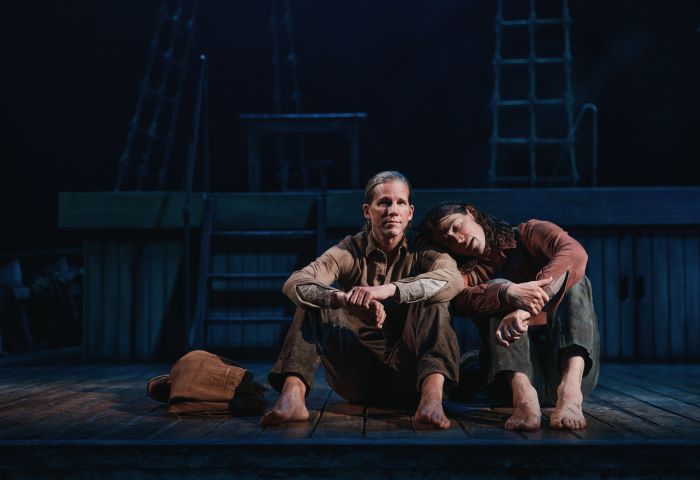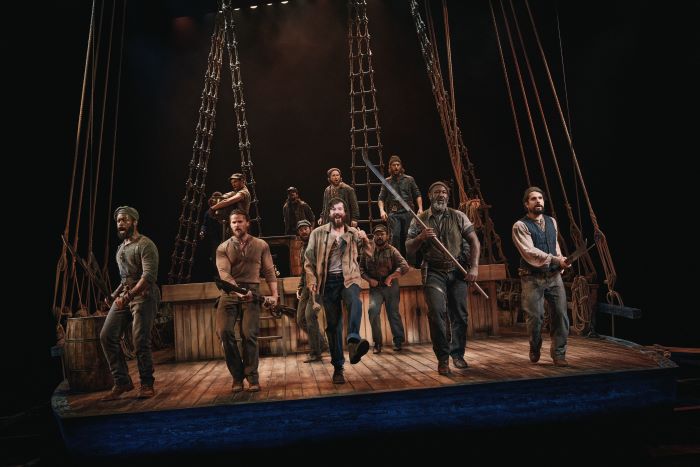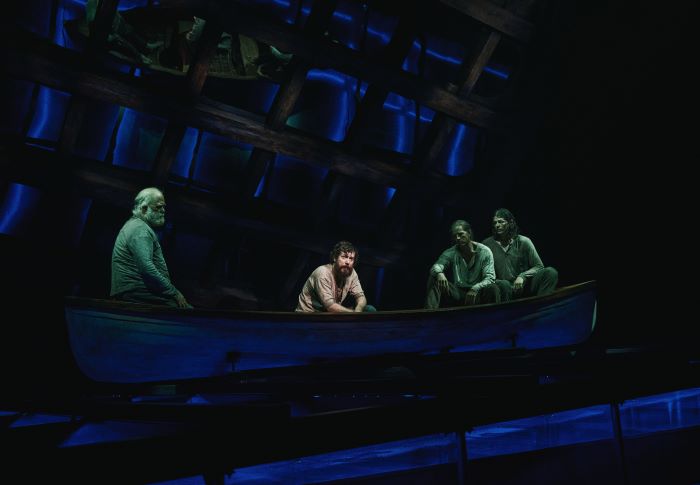Framed in the format of a memory play, the new jukebox musical Swept Away, with a book by John Logan and songs by the folk-rock band the Avett Brothers (including five from their 2004 concept album Mignonette, about a real 19th-century shipwreck on which the fictionalized theme is based), is now playing on Broadway at the Longacre Theatre, following sold-out runs from coast to coast. It tells the life-and-death story of the crew on the farewell voyage of a doomed whaling ship that set sail from New Bedford, Massachusetts in 1888, and was destined for the scrapyard after its final journey (since whale oil was then being replaced by paraffin wax and kerosene). Seen from the deathbed perspective of Mate – the longest living of only four men to have escaped the capsized ship – the ghosts of the other three, who, along with him, made it out of the wreckage onto a small storm-tossed lifeboat, appear and urge him to recount the harrowing events of two decades earlier and to forgive himself for what he did to survive, in a Christian parable of guilt and redemption.

He does so, with some hesitancy, relaying that just before the ship was about to depart, an excited and ingenuous Little Brother, bored with life on his family’s farm and not yet ready to commit to marrying his girlfriend, jumps onboard in search of adventure and exposure to the world outside his limited experience. His devoutly religious Big Brother follows, determined to bring him back home, but the younger sibling refuses to go, and before the elder can leave, the ship has left port and he, too, becomes an unwitting member of the crew.

They meet Mate (portrayed with relish and a heavy country accent by John Gallagher, Jr.), a rootless heathen who forges a quick camaraderie with Little Brother (Adrian Blake Enscoe in an outstanding Broadway debut, capturing the development of his character from youthfully naïve to openly loving and willingly self-sacrificing, and bringing his masterful voice to the expressive numbers), their commanding and ultimately disheartened Captain (in a well-played transition from strong to defeated by Wayne Duvall), who demands to be called Sir and adamantly refuses to lead a Sunday prayer as requested by the thoughtful, contented, family-first Christian Big Brother (Stark Sands, in a role that is more emotionally controlled than the others and expressed in the Avett Brothers’ original song “Lord Lay Your Hand on My Shoulder,” but brings a shocking in-character climax to the disturbing narrative), and the hard-working, hard-drinking shipmates (portrayed by the spirited ensemble of Josh Breckenridge, Hunter Brown, Matt DeAngelis, Cameron Johnson, Brandon Kalm, Rico LeBron, Michael J. Mainwaring, Orville Mendoza, Chase Peacock, Tyrone L. Robinson, David Rowen, and John Sygar), who go down with their ship (though their regretful Captain doesn’t).

Under the direction of Michael Mayer, the compelling cast delivers the characters’ distinctive personalities (in defining costumes by Susan Hilferty), vivid re-enactments of the events, poetic soliloquies, segments of direct-address narration, lively dancing (choreography by David Neumann), and the beautiful solos, duets, and group harmonies on the Avett Brothers’ fourteen tone-setting songs, backed by eight resonant musicians (Will Van Dyke, Matt Deitchman, Kevin Ramessar, Yuka Tadano, Anna Parks, Caleb Burhans, Allison Seidner, and Dan Berkery), with rich arrangements and orchestrations by Chris Miller and Brian Usifer, and music direction by Van Dyke. (My one complaint about the program is that the songs are listed in alphabetical order, rather than in the order in which they’re sung, making it difficult for those not familiar with the Avett Brothers to follow).

Key to the production is the imposing artistic design, which skillfully transports us to the ship and the dire conditions that caused its destruction and the deaths of its crew. Rachel Hauck’s set realistically recreates the large-scale wooden main deck, towering masts, and rope ladders that are upended in the severe storm, rising to the heights of the stage, the lifeboat that swirls in the turbulent waters, and the hospital bed from which the dying Mate sees the phantom apparitions that demand he tell his story. The encompassing sea and sky are defined by the sounds of seagulls, crashing waves, and the sharp cracks of thunder amidst the ringing of the ship’s bells (sound by John Shivers), fog effects, points of starlight, and flashes of lightning (lighting by Kevin Adams), and a cold wind that blows through the audience and provides an immersive chill as it takes down the ill-fated ship.
Swept Away is not your usual feel-good musical, but a dark tale that poses the moral question of what you would do and how far you would go to survive, and offers hope and salvation through sacrifice and prayer, with a stellar cast, score, and design that bring the haunting odyssey to life.
Running Time: Approximately 95 minutes, without intermission.

Swept Away plays through Sunday, December 29, 2024, at the Longacre Theatre, 220 West 48th Street, NYC. For tickets (priced at $54-272, including fees), go online.



